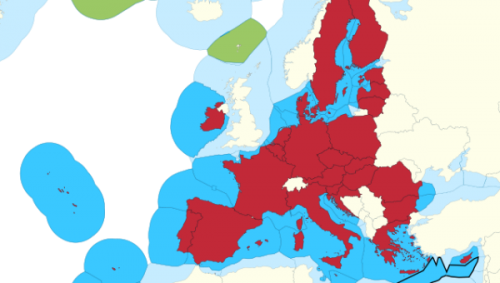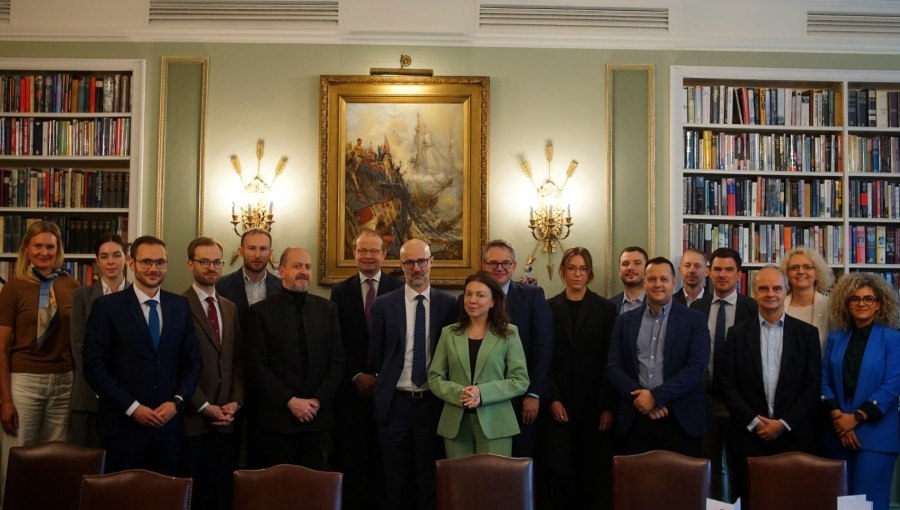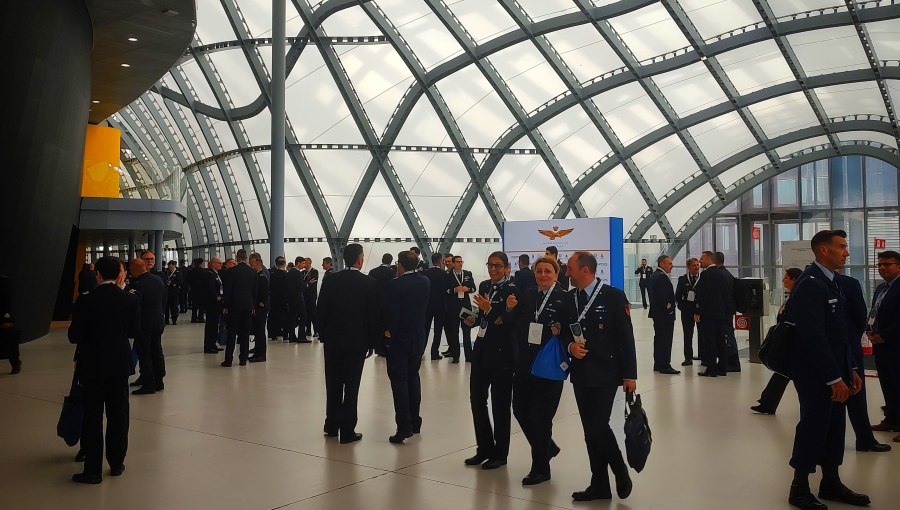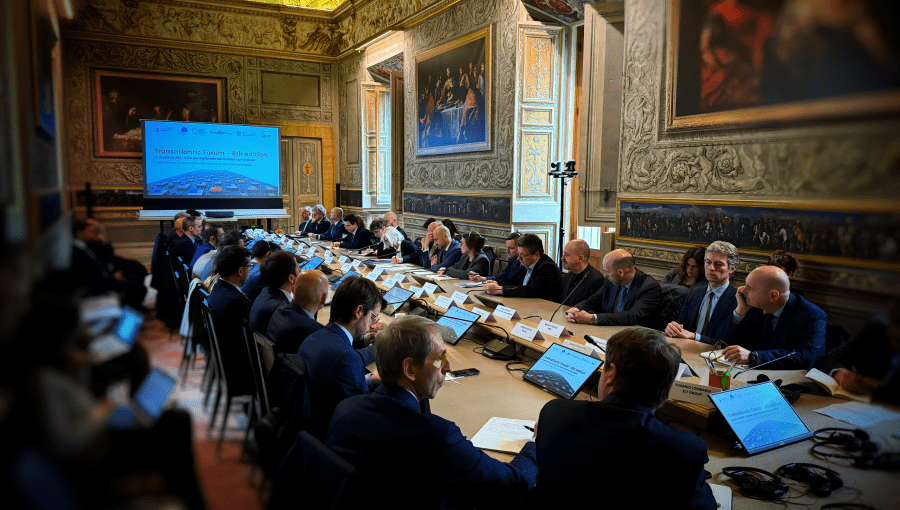The European Metamorphosis: Europe in a Post Pandemic World
The Conference
Francesco Lapenta, Founding Director of the JCU Institute of Future and Innovation Studies participated in the international conference: “The European Metamorphosis: Europe in a Post Pandemic World” held from June 18- 20, 2021 in Taormina and Messina, Sicily.
Organized for the second year by “Vision” (a think tank committed to strategic thinking), “Taobuk” (Taormina Book Festival), and the Università di Messina, the two-day conference in Taormina invited “thirty visionary intellectuals, policymakers, journalists, writers, artists, philosophers and historians” to continue the discussion on how to build a European Union capable of adapting to the complexity of the post-pandemic world and the challenges of the 21st century.
Europe seems to be still structurally slow to respond to the shocks that may even become a permanent feature of the 21st century. In some instances, paradoxically, it even seems that things might have be better managed at the level of single member states. The opinion elaborated at the conference was that the time has come for a new start, for a new metamorphosis of Europe. It is time now for a new start and this is why Vision and Taobuk decided to scale up the conference and make the focus on problem-solving one of the key themes in what promises to be a decisive year.

The European Metamorphosis: Europe in a Post Pandemic World
The Role of Europe: Three Themes
The first conference in Messina/Taormina produced a manifesto and an agenda on three specific themes – the role of Europe in the battle for global digital leadership, new forms of participation to make EU the lab of the democracy of the future, a cluster of integrations as the new institutional mechanism to provide the EU with greater efficiency and legitimacy. In this second conference, one of the themes discussed was that of democratically accountable global digital platforms as a European alternative. According to an agenda developed for the conference by Vision and the group: “If we consider the battles defining the quest for global digital leadership, Europe seems to have not even fully entered them. There is no European global digital platform for e-commerce or for social networking and with the departure of the UK, the EU lost any presence in chip making. Nokia and Ericsson have long lost all significant trains of innovation on mobile production and design. As far as 5G, rechargeable batteries for digital devices, control of rare materials (from cobalt to nickel) Asia is leaping forward; and more importantly, it is the pandemic which is showing that in terms of wide adoption of digital technologies in cities, hospitals, and education that Europe is being left behind.”
The consequences of such a delay are far-reaching. Practically in none of these areas is the EU is competing for market leadership. The consequences, however, are not only on an economic plane. If it is still true that “information is power,” we, then, have a very powerful explanation encompassing the many different crises we witness and comment on at the national level and for which we still miss some theory. The Internet era has massively reallocated information, and, consequently, the forms through which power is achieved, limited, and exercised need to be reorganized.
The idea of a “digital Union” (or of a more controversial “digital sovereignty”) is, therefore, not only an urgent priority but the possibility to provide to the Union a mission that is relevant enough to justify its political survival in the 21st Century. After all the construction of modern nation-States found its powerful economic motivation and then legitimacy in the need to develop transportation infrastructures. Roads, railways, squares, and ports would allow factories to exchange goods so that they could specialize and increase productivity using the marvels of mechanization. Digital platforms are the equivalent of those infrastructures. They are the “pathways” through which services, goods, ideas, and relations are channeled in the 21st Century. So far, however, Europe has let its own future slip through its hands. A handful of private companies – some only recently made public in the US (and, as such, regulated by the SEC), others Chinese (and, as such, rigidly controlled by the Chinese Communist Party) – own the contemporary “infrastructure” we all use. It will be very difficult for Europe to be a leader in standard-setting in the digital domain if it is not a leader in terms of companies and capabilities.
It is, thus, a question of state-of-the-art regulations and policies, but also of investments: both in new, public European platforms and in start-ups that will create services for those platforms.
The work at the conference focused on providing solutions to these strategic problems. A report is being drafted and will be made available when ready.
Participants
Stefania Giannini (Assistant Director for Education, UNESCO and former Minister for Universities, Research and Education in Italy)
Bill Emmott (Author of “The fate of the West” and former editor of The Economist)
Romano Prodi (Former Prime Minister of Italy and Former President of the European Commission)
Manuel Vilas (Columnist El Mundo and El PAIS)
Giorgia Meloni (Leader of Italy’s FDI Party, Member of Parliament, President of the European Conservatives and Reformists Party)
Maria Cristina Messa (Italy’s Minister for Universities and Research)
Mario Nava (European Commission DG REFORM – Director General)
Koert Debeuf (Director of the Tahrir Institute for Middle East Policy Europe and Editor in Chief, EUObserver)
Gaetano Armao (Assessore Economia Regione Sicilia)
Paolo Gentiloni (European Commissioner for Economy)
Laurence Boone (Chief Economist OECD)
Salvatore Cuzzocrea (Rector University of MESSINA)
Gaetano Armao (Assessore Economia Regione Sicilia)
Antonella Ferrara (President and Founder TAOBUK – Taormina International Book Festival)
Francesco Grillo (Director Vision)
John F. Ryan (Director Public Health, European Commission, DG Health and Food Safety)
Franco Bassanini (President AREL and President of the Board at OPEN FIBER)
Elisa Ferreira (Commissioner Regional Policies)
Alexandra Geese (MEP, Alliance 90/ The Greens)
Gioia Ghezzi (Chairperson at EIT – European Institute of Innovation and Technology)
Ernest Wilson (Former Dean of Annenberg School of Communication in LA and Director of the USC center for Third Space thinking)
Francesco Lapenta (Institute of Future and Innovation Studies. John Cabot University, Rome)
Paul Nemitz (Principal Adviser on Justice Policy, EU Commission, Member of German Data Ethics Commission, Global Council on Extended Intelligence)
Francesco Bonfiglio (Chief Executive Officer at GAIAX)
Eli Hadzhieva (Dialogue for Europe)
Beatrice Covassi (Minister Counsellor for the Digital economy at the newly established EU Delegation to the UK)
Steven Everts (Senior Advisor on strategy and communications at the European External Action Service)
Franco Bassanini (President AREL and President of the Board at OPEN FIBER)
Alfio Puglisi (King’s College London)
Cosimo Pacciani (Senior Advisory Board Member, International Research Centre on Artificial Intelligence, UNESCO and former Chief Risk Officer at European Stability Mechanism)
Marco Maria Aterrano (Università degli Studi di Messina – docente di Storia Contemporanea)
Stefania Baroncelli (Professor Public and European Union Law at Free University of Bozen-Bolzano)
Ulrike Guérot (Founder and Director of the European Democracy Lab (EDL)
Antonio Nicita (Principal Adviser European Commission, Member of the Regulatory Scrutiny Board)
John Hooper (correspondent of The Economist)





